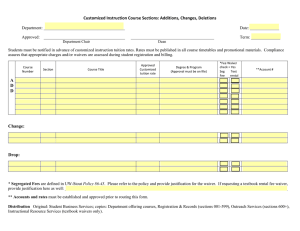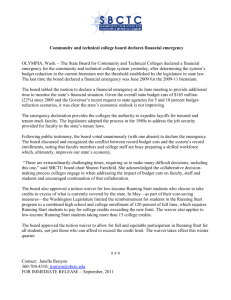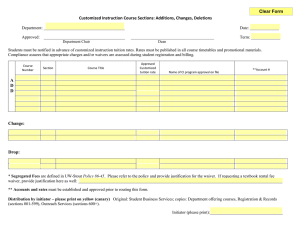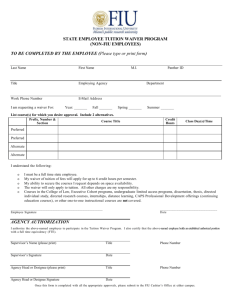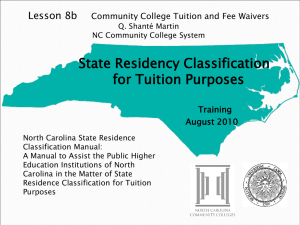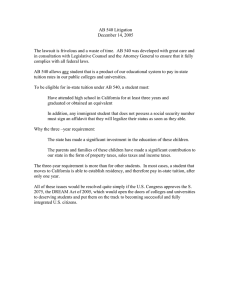May 24, 2004 Ref.: 04-35-36 TO:
advertisement
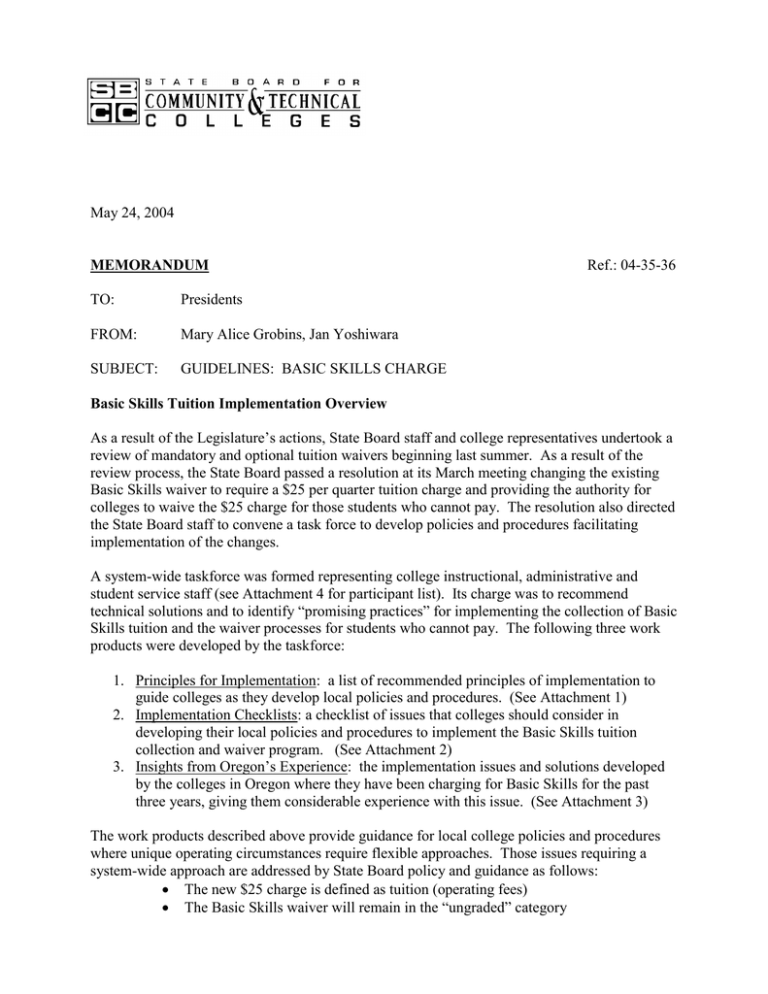
May 24, 2004 MEMORANDUM TO: Presidents FROM: Mary Alice Grobins, Jan Yoshiwara SUBJECT: GUIDELINES: BASIC SKILLS CHARGE Ref.: 04-35-36 Basic Skills Tuition Implementation Overview As a result of the Legislature’s actions, State Board staff and college representatives undertook a review of mandatory and optional tuition waivers beginning last summer. As a result of the review process, the State Board passed a resolution at its March meeting changing the existing Basic Skills waiver to require a $25 per quarter tuition charge and providing the authority for colleges to waive the $25 charge for those students who cannot pay. The resolution also directed the State Board staff to convene a task force to develop policies and procedures facilitating implementation of the changes. A system-wide taskforce was formed representing college instructional, administrative and student service staff (see Attachment 4 for participant list). Its charge was to recommend technical solutions and to identify “promising practices” for implementing the collection of Basic Skills tuition and the waiver processes for students who cannot pay. The following three work products were developed by the taskforce: 1. Principles for Implementation: a list of recommended principles of implementation to guide colleges as they develop local policies and procedures. (See Attachment 1) 2. Implementation Checklists: a checklist of issues that colleges should consider in developing their local policies and procedures to implement the Basic Skills tuition collection and waiver program. (See Attachment 2) 3. Insights from Oregon’s Experience: the implementation issues and solutions developed by the colleges in Oregon where they have been charging for Basic Skills for the past three years, giving them considerable experience with this issue. (See Attachment 3) The work products described above provide guidance for local college policies and procedures where unique operating circumstances require flexible approaches. Those issues requiring a system-wide approach are addressed by State Board policy and guidance as follows: The new $25 charge is defined as tuition (operating fees) The Basic Skills waiver will remain in the “ungraded” category The tuition waiver is only for students who cannot pay The tuition charge is $25 each quarter the student is enrolled The revenue generated by the new basic skills charge is to be used in support of the basic skills programs Residency determination for basic skills students is still not required Local college refund policies are now applicable to basic skills students IRS rules exempt colleges from the due diligence requirement to collect Social Security numbers for basic skills enrollments Course coding and other administrative instructions will be provided to the appropriate offices of your campus in the near future. Questions about the attachments should be directed to Chuck Greenough at 360-704-4380, Tom Woodnutt at 360-704-4306 or Israel Mendoza at 360-704-4326. cc: Basic Skills Program Coordinators Registrars Student Services Officers Controllers Accounting Managers Financial Aid Offices Attachment 1 Basic Skills Task Force Principles of Tuition Implementation Principles of Implementation - following is a list of recommended principles for colleges to use when developing local policies and procedures for the collection of the $25 Basic Skills charge and implementing the waiver process. Minimal impact on faculty and support staff – processes should be designed so as to have minimal impact on faculty and staff Avoid cash collection by faculty – procedures should not include collection of tuition by faculty Minimize barriers to access – processes should be designed so as not to create a barrier to access; keep in mind life circumstances of the population being served – consider who might not have a checking account, be able to get to a post office, etc Communicate clearly and broadly – include plans that provide clear communication to all affected including students, faculty and staff; include consideration of language barriers, etc. likely to be encountered with students Create simple waiver processes – an overly complex process for waivers would likely become a barrier to access and adversely impact staff workload Meet audit criteria – tuition collection procedures need to include consideration for adequate internal controls Implement processes to include third party billing – procedures need to address issues around billing third party partners Preserve dignity of students - waiver process should be designed with preservation of student dignity as a hallmark; think about the process from the perspective of the student population Attachment 2 page 1 Basic Skills Task Force Checklists Possible College District Boards of Trustees Policy Issue Checklist Basic Skills Waiver Policy – the State Board resolution establishing the $25 per quarter tuition also provided flexibility for colleges to waive tuition for students who cannot pay; each college district board needs to update its waiver policy to establish the process and basis for Basic Skills waivers Concurrent Enrollment Agreements – colleges should review and update as appropriate, their policy and agreements addressing concurrent enrollments Applicability of college/student fees to ABE/ESL enrollments – it may be necessary to update college policies regarding when supplemental fees are applied to student charges Payment due date rules related to ABE/ESL courses – colleges tend to have varying practices dealing with the intake of new students and when a student is officially enrolled that might affect when tuition will be charged College Administrative Issues Checklists Communication Avenues – colleges should consider all the various means by which communication of this new charge will be facilitated College Catalog Course Schedules Newsletters – Student/Campus Web Sites Correspondence with Partnering Agencies – social service agencies, CBOs, etc. Other written materials requiring updating Communication directed at those points of contact for the basic skills student population such as churches and other faith-based organizations Other non-print communications for people with less well developed reading skills such as radio and TV public service announcements, graphics-based posters Registration Issues – Issues related to registration that should be considered as colleges develop plans to implement the Basic Skills tuition charge Open enrollment issues – with Basic Skills courses often offered on an open enrollment basis, colleges should consider when tuition will be assessed; the basic rule of thumb is that if the student will be reported for state ftes for any given quarter, tuition should be assessed; so, a one-credit equivalence begun the last week of the quarter would carry the same $25 tuition as a full quarter of 18 credits. Non-payment and when or if to drop – because of the difficulties associated with communication and collection of this small tuition amount, some colleges are deciding not to drop students for non-payment but rather use the unusual action code to block future enrollment Attachment 2 page 2 Basic Skills Task Force Checklists (continued) Registration and mail in payment – disconnect and associated problems – colleges considering a mail-in payment process for remote sites, should address the issue of the timing difference between the arrival of registration materials submitted by faculty and payments received from the students Limited role of faculty – faculty should not be involved in the tuition collection or waiver process: for remote sites with no access to administrative support, it is recommended that alternate payment methods such as mail-in be developed By mail – address issues – some colleges have adopted a process whereby Basic Skills students are billed; an issue to consider with this approach is the availability of valid addresses for the students Waiver Issues Amount of waiver – percentage? – the State Board resolution contemplates only a full waiver of the $25 charge Waiver availability and effect on attendance patterns – differences between campuses –colleges are advised to consider the impact of local waiver policies on student access as well as comparability with other colleges in the area Scholarships vs. foregone revenues–colleges are encouraged to consider development of scholarship funds as an alternative to waivers Where is waiver administration handled? –The most effective processes seem to be those that are simple and managed by Basic Skills administrative staff Documentation requirements for waivers – local issue based on local board policy (see list below for documentation ideas developed by the taskforce) Note: colleges policies should identify the forms of documentation to be retained in student files to substantiate the basis for waivers Potential Documents Supporting Low Income Status (inability to pay) QUEST Card: Food Stamp Debit Card Washington State Medical Coupons Basic Health Plan Card such as Community Health Plan Card DSHS WorkFirst Individual Responsibility Plan Employment Security Benefits Statement HUD Housing Award Letter WIC Coupon DSHS General Approval Cash/Food Letter Working Connections Child Care (WCCC) Award/Change Letter Letter requesting waiver (on letterhead) from a community-based or faith-based organization e.g., refugee center, mission, Salvation Army, etc. SSI program notifications (SSI can pay the $25) General Assistance Unemployment Notice Referral letters from domestic violence shelters, transitional homes, DVR, etc. Free or reduced lunch documentation Other documentation as determined by the college such as a student’s declaration that he or she is unable to pay Attachment 3 The Oregon Experience – Basic Skills Tuition Collection and Waivers Collection Practices Collect tuition from new students at orientation and testing Bill students at remote locations Students not able to pay are not dropped from class but have a hold on future registrations Use simple check sheet signed by student and college staff for waiver documentation Bookstore used to collect money at off-campus locations (one college had a traveling bookstore operation that visited each remote site periodically) Students given self-addressed, postage paid envelopes to submit payments Use multipart form for registration with copy given to student to send in with payment. Registration form is turned in and bill is generated from registration. Bills returned to instructors for distribution in class. Students pay based on billing. Staff go to sites on set days and times for collection Bill agencies whenever possible Cashiering and registration open set times at beginning of quarter Waivers Basic Skills office manages scholarships/waivers Colleges have been successful generating funding for scholarships providing for increased revenue from tuition collection (fewer waivers) One college signs off on a student’s written statement of need as a basis for waiver qualification; Student agrees to attend 80% of classes to get waiver. Meeting this standard is the basis for eligibility for future waivers. Waivers part of intake process for new students The experience of Oregon colleges varied depending on their particular circumstances. In general, the colleges tried to keep the waiver process very simple to reduce administrative workload and to minimize the impact on students. Also, their experience has been that a very small percentage of the students obtain waivers. Note – In Oregon, the fee charged to Basic Skills students was implemented for the express purpose of raising money to support the program. Many of the Oregon rules and practices were shaped by this intent.
